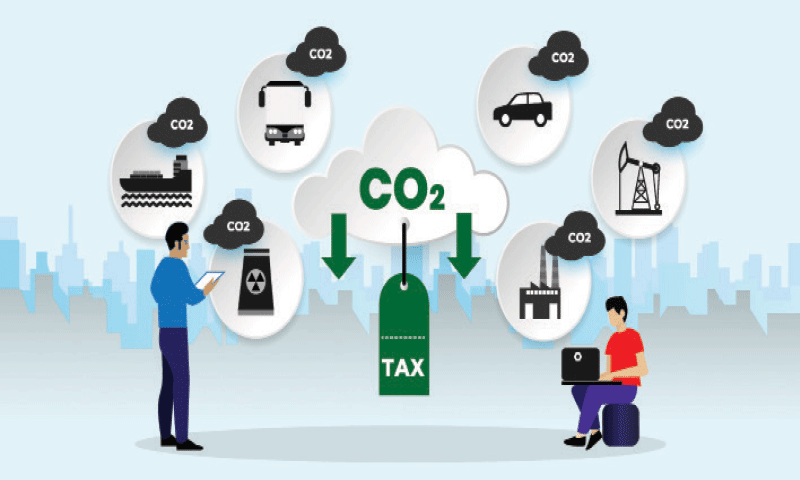The proposal to implement a carbon tax has been under discussion for quite some time in Pakistan. This topic was revisited during the recent inaugural meeting with the International Monetary Fund (IMF) to finalise the Resilience and Sustainability Facility — a loan intended to assist climate-vulnerable nations.
Pakistan’s carbon emissions are rising, mainly due to its reliance on fossil fuels, especially in road transport, coal-fired power plants, and inefficient industrial practices. Since 2010, the total greenhouse gas (GHG) emissions have increased by 41 per cent, but they still represent only 1pc of the global GHG emissions. The country’s carbon footprint is even smaller, accounting for just 0.5pc of the global carbon footprint, though it has risen by 29pc since 2010.
Pakistan, indeed, is not among the top global emitters. Yet, it is among the top affected by climate change (floods, heatwaves, and glacial melting). Carbon tax is pitched as an effective tool to discourage the use of fossil fuels and encourage a shift to less polluting fuels, thereby limiting carbon emissions, the most prevalent GHG globally, but not in Pakistan.
The effectiveness of carbon taxes worldwide is mixed. So far, 27 countries have implemented these taxes, with European countries leading the way, starting with Poland and Finland in 1990. While these taxes generate revenue, their effectiveness depends on revenue use — some countries fund general budgets, while others invest in climate projects.
A carbon tax focused on meeting tax-to-GDP targets but neglecting fairness, efficiency, certainty, and convenience would likely worsen existing distortions in the tax system
In China, the largest emitter of greenhouse gases, a cap-and-trade system provides companies with free emission allowances based on carbon intensity benchmarks. Companies exceeding their allowances must buy additional permits, which encourages them to reduce emissions. Likewise, India, the third largest emitter, has cut fossil fuel subsidies while pursuing a carbon market instead of a carbon tax.
Carbon taxes are often proposed for developing countries like Pakistan, which have informal economies and limited tax bases. The argument is that effective implementation of this fiscal tool could drive industries to adopt cleaner technologies to avoid high carbon costs. However, given the current budget constraints, there is no guarantee that the revenue from this tax will support cleaner technologies or climate adaptation in Pakistan.
Moreover, carbon taxes can alter choices and divert resources from their best use, making people worse off. It increases the cost of carbon-emitting activities. Although it may reduce demand and benefit the environment, it can also decrease overall economic activity.
Pakistan’s economy is already facing significant challenges. Tax rates for formal businesses are quite high, and there are numerous taxes on energy. The petroleum levy has risen to Rs70 per litre for petrol and diesel under IMF influence.
Additional burdens like a carbon tax will further raise production costs and contribute to inflation, impacting essential goods such as food and transportation. Low-income groups will be hit hardest, as they already allocate a significant portion of their income to these items.
Beyond oil, carbon taxes can be applied to coal and natural gas based on their carbon content, which can be collected from fuel suppliers. These suppliers will pass on the costs to consumers, increasing prices for electricity, gas, and related products.
This incentivises consumers to reduce energy usage and switch to lower-carbon fuels or renewable energy sources. However, the effectiveness of this approach in Pakistan is limited by the lack of low-carbon alternatives and widespread economic hardships.
Industries are losing competitiveness due to rising energy costs. It is unlikely that a new tax will encourage them to switch to cleaner fuels; instead, it may further increase their struggle to remain competitive, particularly for energy-intensive sectors such as cement, textiles, and steel. This situation could lead to reduced production and job losses, as higher production costs may make Pakistani goods less competitive on the global market, negatively impacting export earnings.
Moreover, Pakistan’s reliance on fossil fuels makes carbon taxes politically and economically sensitive. Investors may also hesitate to invest in sectors that become more expensive or negatively affected by carbon taxation. Pakistan’s investment-to-GDP ratio is currently low, falling to a 50-year low of 13.1pc in FY24; further contraction in investments due to a distortionary policy would be unwise.
Grid infrastructure is obsolete and needs an upgrade. The power sector has faced a persistent circular debt issue due to inefficiencies; capacity payments are rising due to long-term contracts. These factors are limiting investment in the grid and integration of renewables. Electricity generated from Thar coal (dirty fuel) is even cheaper than hydropower. However, this does not imply that we should increase our dependence on this energy source; instead, a balance is required by diversifying our energy portfolio with cleaner fuels.
The government should promote the voluntary adoption of greener practices. The main barrier to renewable energy in Pakistan is policy inconsistency, not a lack of funds. Consistent policies and legislative measures are essential for encouraging widespread adoption of renewables. Tax credits can incentivise investments in energy-efficient technologies, reducing emissions.
Balancing energy security, economic growth, and environmental sustainability is crucial for Pakistan. Without reliable and affordable energy, industries, businesses, and households suffer, leading to economic instability.
Pakistan focuses on meeting tax-to-GDP targets but neglects fairness, efficiency, certainty, and convenience. A carbon tax would likely worsen existing distortions in the tax system.
The writer is a senior research economist at the Pakistan Institute of Development Economics, Islamabad.
Published in Dawn, The Business and Finance Weekly, March 31st, 2025


